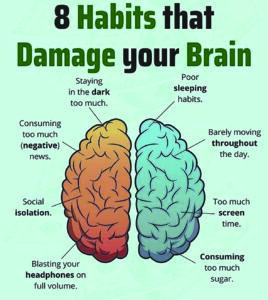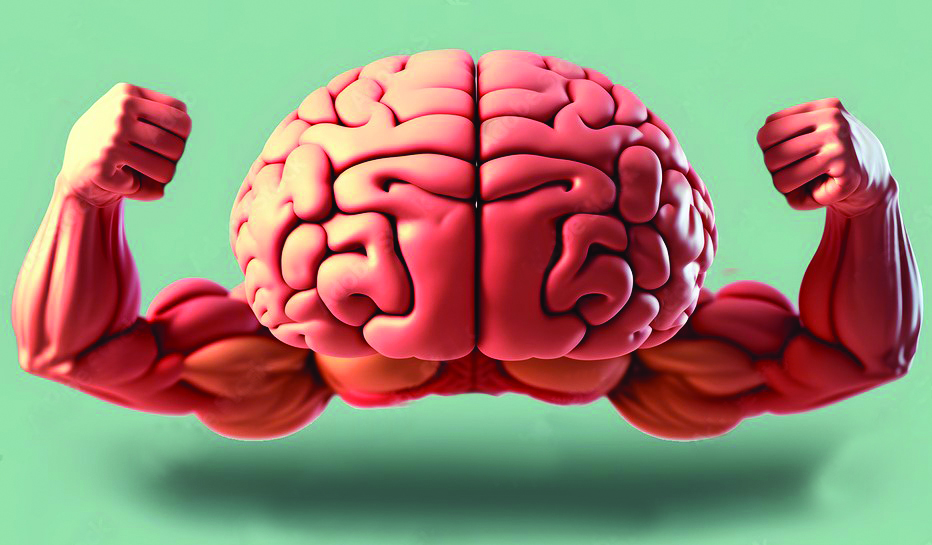 Every second that we are kicking and alive, is associated with our brain health. Ironically, we tend to focus a lot more on our physical wellbeing and health, often neglecting simple habits that can enhance neurological and cerebral health. The brain is an organ which survives on stimulation and activity. While there are books and journals that enlighten and educate us on brain health, there has been little discussion on habits and behaviours that are a complete no-no, in terms of keeping your brain power on and energised.
Every second that we are kicking and alive, is associated with our brain health. Ironically, we tend to focus a lot more on our physical wellbeing and health, often neglecting simple habits that can enhance neurological and cerebral health. The brain is an organ which survives on stimulation and activity. While there are books and journals that enlighten and educate us on brain health, there has been little discussion on habits and behaviours that are a complete no-no, in terms of keeping your brain power on and energised.
Many habits contribute to poor brain health, but the ones that have been clued on, as the most detrimental and having the greatest impact on poor brain function, are simple everyday things that we tend to overlook. These include too much sitting; inadequate sleep or erratic sleep-cycle; lack of socializing and chronic stress. The good news is that we have it in our control to change these habits, behaviours and patters, which would lead to enhanced brain power!
Don’t Take This Sitting Down!
Did you know that the average adult sits for over six-and-a-half-hour every day! Chair-time can have an immense impact on brain health. MTL (Medial Temporal Lobe) is a brain region that makes new memories in adults at the ages between 45-75. Researchers have used MRI scans to see and compare the scans of people that sat more against people who sat less, by virtue of their daily activities. Those who sat longest had the thinner MTL regions. As per research, MTL thinning is the greatest precursor to cognitive decline and dementia.
Get Your Zzzzzz Going!
One third of most adults don’t get the recommended seven to eight hours of daily sleep. Inadequate sleep is directly related to loss of memory, reasoning and ability for problem-solving, over time. Focus on giving yourself more time to sleep – get to bed an hour earlier or cut down on those late nights. Give your body and your mind enough time and rest to relax, reboot and recharge. If you can’t sleep or wake up in the middle, do not expose your eyes to any electronic devices (mobiles, laptops or TV) – instead try meditating or reading a real book.
Socialize More!
As per research, the less socially active we are, the more we lose the brain’s grey matter, the outer layer that processes information. Loneliness is linked to depression and puts you at a higher risk for Alzheimer’s. The more you interact, the more you benefit. Find the two or three people with whom you can share anything. Make them your social pod so to speak. Text or call them regularly. Your interactions and social engagements with them have to mean something. You want basically meaningful and mentally stimulating conversations. So do choose your people with care. They have to be the ones you care about and vice versa.
Stress Out!
Chronic Stress can lead to a brain-kill faster than anything else. Stress damages brain cells in the prefrontal cortex, the area responsible for memory and learning. A major stress-trigger for older adults is the ‘my way-or -the-highway approach’ to everything. This mindset can trigger negative reactions that raise your stress levels when things don’t go your way. Be flexible with your reactions and with the way you need to control things, people and situations. When you feel stress coming on, take deep, deep controlled breaths and remind yourself you don’t always know best, and learn to accept that other approaches may also be just fine.
There are innumerable habits which negatively impact our cerebral functioning – like overeating, dehydration, spending too much time in the dark, listening to loud music through earphones, sugary foods and beverages, smoking, being stationary. Negative thinking and negative thoughts impact general health and mental capacity over time.
Feed yourself positivity through literature, sports, culture, travel and healthy relationships. Brain Power is the one essential to the quality of life we lead. After all, all our associations, our interactions our assimilation of the world and our own life-experiences are based on it!
- Walk Away! - 20 April2024
- Brain Power - 6 April2024
- Celebrating Our Iranian Brethren! - 16 March2024
